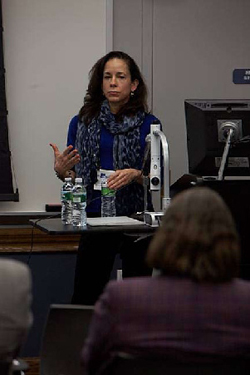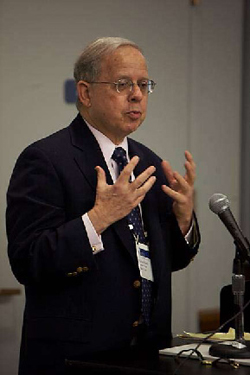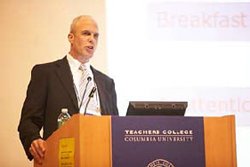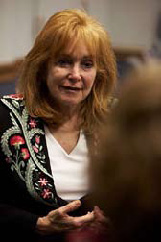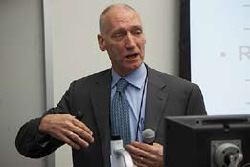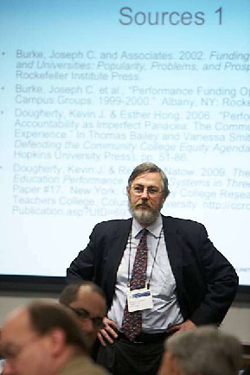State Legislators Gather at TC
TC is first school of education to host the National Conference of State Legislators Annual Event
School choice policies and the federal No Child Left Behind (NCLB) law, which were intended to increase educational opportunity for poor and minority students, have instead had the opposite effect.
That finding, from research by Amy Stuart Wells, Professor of Sociology and Education, was just one of many policy-related insights offered by TC faculty members to some 150 state legislators and policy experts who assembled at the College from around the country on March 13th to talk about what strategies are working to improve education.
The gathering—the National Conference of State Legislators’ annual national education seminar—was co-sponsored by TC’s National Center
Fuhrman opened the proceedings by proclaiming the College’s ongoing support for elected officials and policymakers and a continued commitment to research-based education reform. “The role you play is vital to the interests of our nation’s young people—and the goal of Teachers College is to be a resource to you in your work,” said Fuhrman, adding that her own association with NCSL has spanned nearly 40 years, dating back to her time at the Eagleton Institute of Politics at Rutgers, where she studied legislative leadership, and continuing on at the Consortium for Policy Research in Education, which she founded and continues to direct.
Matt Camp, TC’s director of government relations, said NCSL chose Teachers College to hear about current research that can affect education policy in the states. “We are honored that NCSL recognized TC as central to the national education dialogue, and that so many state legislators, who are key in setting education policy across the country, were able to hear the latest research findings from TC faculty.”
In her presentation, Wells said that nearly 50 states have adopted inter-district enrollment policies, which permit students to attend schools out of their home districts. Such policies “have allowed more advantaged students to transfer to relatively more advantaged school systems, thereby exacerbating inequality between school districts,” Wells said. She added that NCLB accountability pressures “likely play an additional role” in re-segregating schools following the integration efforts of the 1970s and early 1980s.”
NCLB has given districts “even less incentive to serve students [who] may have lower levels of academic performance,” Wells said. “Why, in such a highly competitive environment with a heavy focus on test scores, would many schools or districts choose to accept students with lower test scores and more disadvantage?” As a result, middle-class and affluent districts often deny entry to students from nearby impoverished areas.
This is true despite documented, long-term positive outcomes for minority students who transferred to majority white schools, including access to more prestigious educational institutions and to jobs that are traditionally filled with fewer blacks, said Wells, who found a strong desire among whites and minorities in many communities to integrate their schools.
The best intentions, however, must be backed by funding. Michael Rebell, director of the College’s Campaign for Educational Equity, has studied state education funding formulas and concluded that many are denying schools in poorer districts their fair share of state education support. Worsening matters, states are cutting education funds deeply during the current recession, leaving many school districts—especially poor ones—without the funding to provide even basic education, Rebell said. States need to protect core services and do more for less cost, but they are constitutionally required to provide a minimal level of education—however each state defines that. “Kids still have constitutional rights, even in the midst of a recession,” he said.
In another session, Charles E. Basch, TC’s Richard March Hoe Professor of Health Education, presented his latest research showing that seven “educationally relevant” health factors—poor vision; asthma; teen pregnancy; aggression and violence; insufficient physical activity; insufficient breakfast; and inattention and hyperactivity—disproportionately affect low-income students and work together to inhibit academic their progress. Basch was introduced to the audience by Eleanor Sobel, a TC alumna who is now a state legislator in Hollywood , Florida
“These data are absolutely staggering, but they’re old news,” Basch said. “What’s new is how these health problems affect education and learning in schools.” He pointed to “pathways” through which these health disparities affect children, including sensory perception, cognition and connection to school.
Thomas Bailey, director of TC’s
Kevin Dougherty, associate professor of higher education at TC, spoke about performance-based funding, which links state funding of higher education to institutional performance indicators such as course completion, degree completion, or the number of low-income and minority graduates—a pressing issue for states having to slash education budgets.
On Friday, March 12, participants in the NCSL conference visited Maria Teresa Mirabal Middle School in upper Manhattan to meet with leaders and graduates of the New York City Leadership Academy
On Sunday at the Sheraton New York hotel, the group heard a discussion by former U.S. Assistant Secretary of Education Diane Ravitch and Deborah Meier, known as the founder of the small schools movement, who together write the Education Week blog, Bridging Differences. Their discussion was moderated by Richard Lee Colvin, director of TC’s Hechinger Institute on Education and the Media.
State legislators clearly came to the conference hungry for research-based ideas on education reform. Lena Taylor, an attorney and state senator from Milwaukee Milwaukee
Nearly a quarter of Milwaukee ’s students receive vouchers, which most use for private school tuition, Taylor Milwaukee Taylor Milwaukee
Sobel, reacting to Basch’s discussion of the connection between health problems and school performance, said the weekend provided confirmation that her work on education issues in Florida
Sobel said she benefits from her graduate degree in special education from TC, even now, when she is no longer in the classroom. Her background as a teacher helped her get elected against two male attorneys in Florida
Published Monday, May. 10, 2010
